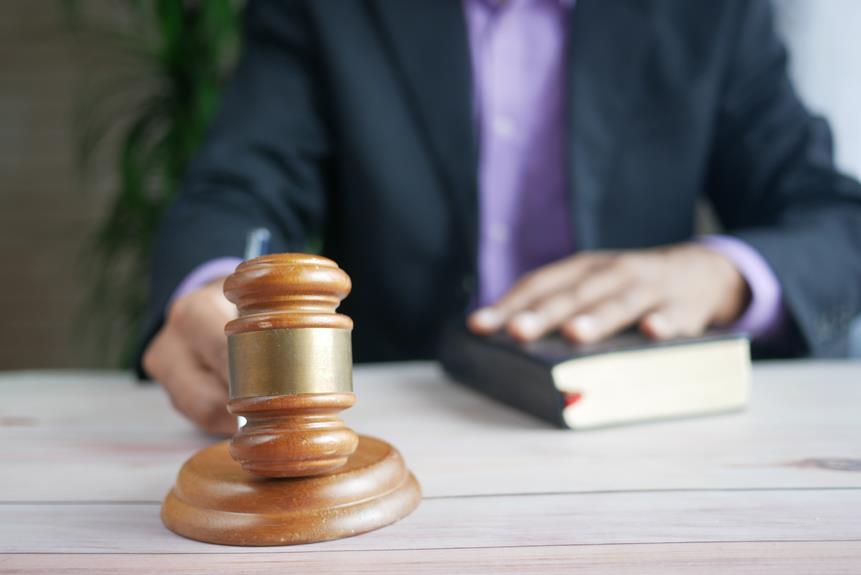Devastating Internal Injuries: Uncover Your Legal Rights
In this comprehensive guide, we explore the complex issue of internal injuries resulting from accidents. Often unnoticed initially, these injuries can lead to severe health consequences. We delve into their types, causes, and symptoms, and importantly, the legal rights of the victims. Understanding the legal implications surrounding these injuries, including liability and compensation, is crucial. This article serves as a vital resource, helping victims navigate the challenging path towards securing rightful compensation.

Key Takeaways
- Internal injuries can be caused by car accidents and other personal injury accidents, and may not be immediately obvious.
- Common internal injuries include internal bleeding, broken ribs and damaged lungs, collarbone fractures, and spleen and liver damage.
- Liability for internal injuries can be determined through personal injury lawsuits based on negligence, intentional torts, or workers compensation.
- Internal injuries can have long-term consequences and may require significant medical expenses, so it's important to consult a personal injury attorney to ensure proper compensation.
The Nature of Internal Injuries
The complexity of internal injuries warrants a deep understanding, as these hidden traumas can lead to long-term health consequences and necessitate substantial knowledge about personal injury law for potential legal proceedings. These injuries, often the result of high-impact accidents, can damage vital organs, causing severe, often life-altering conditions. Understanding the causes and prevention of internal injuries is therefore crucial. Through education and safety measures, the occurrence of such injuries can be mitigated. Yet, the impact of internal injuries on daily life can be profound. Injured individuals may face chronic pain, limited mobility, and reduced capacity to work or engage in leisure activities. These physical limitations, coupled with the emotional trauma, underscore the importance of legal recourse in ensuring justice and financial support for the victims.
Common Causes of Internal Injuries
High-impact accidents and blunt force trauma are prevalent causes of internal injuries, but understanding the complexity of these incidents is crucial in both prevention and subsequent legal recourse. Notably, the causes of car accidents, a leading source of such injuries, range from driver negligence to environmental factors. It's vital to recognize signs of internal injuries post-accident, as they may not surface immediately. Symptoms may include abdominal pain, blood in urine, or an unusually rapid pulse. Early detection can significantly improve prognosis and can substantiate claims in personal injury lawsuits. With thorough understanding of accident causes and injury symptoms, victims are better equipped to seek appropriate medical attention and legal redress, thereby mitigating the devastating impact of these unfortunate occurrences.
Severity and Symptoms of Internal Injuries
Recognizing the severity of internal injuries is a critical aspect of medical intervention, and attention must be given to symptoms such as abdominal pain, rapid pulse, and blood in the urine. The importance of seeking immediate medical attention for internal injuries cannot be overstated, as these injuries, if undiagnosed or untreated, can lead to serious complications or even death. Recognizing delayed symptoms of internal injuries is essential, as they may not manifest immediately after a traumatic event. Symptoms can include fatigue, dizziness, or worsening pain, indicating potential internal bleeding or organ damage. In the realm of personal injury law, it's vital to understand that medical intervention and documentation can significantly impact the strength of your case. Therefore, prompt medical care following an injury should be a priority.
Types of Internal Injuries and Their Impact
Among the myriad forms of internal injuries, five common types are internal bleeding, broken ribs, collarbone fractures, and spleen and liver damage, each carrying potentially significant and life-altering consequences. These injuries can have long-term effects, including chronic pain, limited mobility, and a reduced quality of life. Individuals may face considerable financial strain due to ongoing medical expenses and lost wages. Legal remedies for internal injuries exist, providing compensation options for these burdens. A personal injury lawsuit can be pursued, requiring a demonstration of negligence, or an intentional torts claim, proving deliberate harm. Workers' compensation claims are another avenue for workplace-related injuries. A skilled attorney can guide you through this complex process, ensuring all potential damages are comprehensively claimed.
Understanding the Legal Aspects of Internal Injuries
In the realm of personal injury law, understanding the legal aspects of internal injuries is crucial, as it provides the foundation for pursuing compensation for damages related to these severe and often overlooked traumas. Determining compensation for internal injuries is a multi-faceted process, encompassing factors like current and future medical expenses, loss of earnings, pain and suffering, and potential long-term care needs. This process requires expert legal guidance to ensure that victims are adequately compensated for their damages. The legal journey of seeking justice for internal injuries can be arduous and complex. However, with the right legal representation, the pursuit of justice becomes a viable path, helping victims regain control over their lives while holding the responsible parties accountable.
Determining Liability in Personal Injury Cases
Establishing accountability in personal injury cases often involves a thorough examination of the circumstances leading up to the event, a process that requires a keen understanding of the intricacies of negligence, an abstract concept fundamental to this area of law. Determining liability in car accidents, a common cause of internal injuries, hinges on the ability to discern fault through evidence, eyewitness testimonies, and police reports. Understanding the legal process for personal injury cases is crucial for victims seeking justice. This process includes filing a claim, proving negligence, and demonstrating the extent of harm suffered. A nuanced appreciation of contributory and comparative negligence laws is also essential. Ultimately, the pursuit of justice necessitates a blend of empathy, legal acumen, and a steadfast commitment to the truth.
The Role of Negligence in Personal Injury Lawsuits
While the victim bears the burden of proving negligence in personal injury lawsuits, it is often through the demonstration of a breached duty of care, causation, and damages that a successful claim can be made. Particularly in negligence in medical malpractice cases, the plaintiff must show that the healthcare provider failed to meet the standard of care, leading to the injury. This can be a complex process, requiring expert testimony and meticulous presentation of facts. Similarly, proving fault in personal injury lawsuits involves demonstrating the defendant's failure to act with reasonable care. As the stakes are high, victims are advised to seek legal assistance. A skilled attorney understands the nuances of negligence laws and can empathetically guide victims toward achieving the compensation they deserve.
The Concept of Shared Fault in Injury Cases
Given that the concept of shared fault can significantly impact the outcome of injury cases, it's crucial to understand how various jurisdictions interpret and apply this principle in their legal proceedings. In essence, shared fault acknowledges that the plaintiff may have contributed to their injury. This principle is often applied through comparative negligence, a doctrine that proportionally reduces the amount of damages a plaintiff can recover based on their degree of fault. This can greatly impact personal injury cases, especially those involving complex issues like internal injuries. Furthermore, in the context of workers' compensation claims for internal injuries in the workplace, acknowledging shared fault can influence the amount of compensation awarded. Thus, understanding these principles is vital for those seeking justice for their injuries.
Long-term Consequences of Internal Injuries
The long-term consequences of internal injuries, which can include both physical impairments and emotional distress, are often significant and life-altering, requiring extensive medical care and personal adjustments. The long term impact on quality of life can be devastating, limiting individuals' ability to work, engage in hobbies, or simply lead a normal life. The financial implications of internal injuries are equally substantial. Beyond immediate medical costs, victims may face ongoing expenses for rehabilitation, medications, and assistive devices. Furthermore, they may suffer lost wages or diminished earning capacity. A personal injury claim can provide compensation for these losses, but understanding the full spectrum of potential damages is essential. This underscores the importance of consulting with a knowledgeable personal injury attorney who can provide a comprehensive assessment of your situation.
Calculating Future Damages for Internal Injuries
In assessing a victim's personal injury claim, a meticulous calculation of future damages for internal injuries is paramount, and it should account for both anticipated medical costs and potential losses in earning capacity. The process of calculating future medical expenses requires a thorough understanding of the victim's medical prognosis, potential for recovery, and the costs associated with long-term care or rehabilitation.
Moreover, the emotional impact of internal injuries must not be overlooked. The psychological trauma associated with severe injuries can lead to conditions like depression, anxiety, and post-traumatic stress disorder, affecting the victim's quality of life and ability to work. Therefore, a comprehensive calculation of future damages must incorporate these non-economic damages to ensure an accurate representation of the victim's future needs.
The Importance of Legal Representation
While it is theoretically possible for an injured party to navigate the legal landscape alone, it becomes crucial to secure legal representation when dealing with complex matters such as assessing future damages and negotiating settlements, as a seasoned personal injury attorney can provide invaluable guidance and enhance the chances of a favorable outcome. The benefits of hiring an attorney extend beyond legal expertise. They bring an empathetic understanding of the emotional and physical ordeal clients face, which fuels their commitment to achieving the best resolution. The importance of legal guidance cannot be overstated, especially in cases involving devastating internal injuries where future implications may be uncertain. An attorney can help navigate these complexities, advocating fervently for victims' rights and their deserved reparations.
Gathering Evidence for Your Personal Injury Case
Credibility and thoroughness in gathering evidence for your personal injury case can markedly improve your chances of a successful outcome, but it requires strategic planning and meticulous documentation. A crucial part of this process involves gathering medical records, which can provide indisputable proof of internal injuries and their impact on your quality of life. These records can also help establish a clear timeline of your injuries, linking them directly to the incident in question. Additionally, interviewing witnesses can strengthen the credibility of your claim. Witnesses can corroborate your account of the incident, providing a third-party perspective that can be persuasive in court. In essence, a detailed, empathetic, and robust approach to evidence gathering can significantly enhance your chances of securing a fair settlement.
Selecting the Right Personal Injury Attorney
Choosing the right personal injury attorney, an expert well-versed in the intricacies of internal injuries and their long-term impacts, is a decision of paramount importance for securing a fair settlement, and it requires careful consideration of the attorney's experience, reputation, and approach to client representation. This process of finding the right attorney begins with understanding legal rights, particularly when it comes to compensation for internal injuries. An ideal attorney will be able to explain these rights clearly, ensuring you are informed about your legal standing. Additionally, they should be able to navigate the complexities of litigation, negotiate with insurance companies, and effectively represent your interests in court, if necessary. Ultimately, the attorney you choose should demonstrate empathy, understanding, and a commitment to obtaining the best possible outcome for your case.
Preparing for Your First Meeting With Your Attorney
In preparation for your first meeting with your attorney, gathering all relevant medical reports, insurance documents, and any evidence related to the accident is essential, and it can significantly streamline the legal process. This preparation is critical in establishing a foundation for your personal injury case, particularly when internal injuries are involved. Your attorney can better understand your situation and strategize a comprehensive legal approach when provided with detailed documentation. This process of gathering evidence for your personal injury case allows your attorney to assess liability, calculate potential damages, and formulate a persuasive argument for compensation. Remember, your attorney is there to advocate for you, easing some of the stress of this challenging time. Thus, thorough preparation for this initial meeting is not only beneficial but crucial.
Sharing Your Story to Raise Awareness and Help Others
Often, sharing your personal experience with internal injuries publicly can inspire others facing similar challenges, and it also serves to raise awareness about the severity of such injuries and the necessity for appropriate legal representation. By openly discussing these experiences, we foster a community of advocacy and support for internal injury survivors, which can be extremely beneficial in the healing process. However, it's important to remember that every experience is unique and what worked for one person may not work for another. Moreover, the law pertaining to internal injuries can be complex and varied. Hence, it's crucial to seek professional legal advice to understand your rights and potential remedies. This is not merely about compensation, it's about justice and ensuring that no one else has to experience the same trauma.
Frequently Asked Questions
How Does My Overall Health Prior to the Accident Affect the Severity of My Internal Injuries and My Legal Case?
Your pre-existing health conditions can influence both the severity of internal injuries and the outcome of your legal case. Pre-existing conditions might exacerbate injury severity, requiring more extensive treatment. Legally, these conditions could potentially be used to lessen the liability of the defendant. Therefore, comprehensive injury documentation is crucial to establish the impact of the accident on your health, separate from pre-existing conditions. Consult a legal expert for guidance tailored to your situation.
Can I Seek Compensation for Emotional Distress Caused by My Internal Injuries?
Yes, compensation for emotional distress caused by internal injuries is often recoverable. This claim is typically evaluated through a 'Distress Evaluation' process, which includes considering the severity of your emotional distress, its impact on your life, and its provable duration. Therapy costs, psychiatric treatment expenses, and other related costs may also be factored into the claim. It's advisable to consult with a personal injury lawyer to ensure all damages are properly accounted for.
How Do I Handle Insurance Companies and Their Offers During the Legal Process of a Personal Injury Lawsuit?
Navigating insurance companies during a personal injury lawsuit can be complex. It's crucial to understand liability assessment and employ effective settlement negotiation strategies. Insurers often propose low initial offers, anticipating negotiation. Understanding your claim's value is key to counter their offers. Consultation with a legal professional can provide valuable insights into liability assessment and negotiation strategies, ensuring your rights are protected and you receive fair compensation. Remember, accepting an offer concludes your right to future claims; hence, careful consideration is vital.
Are There Any Specific Laws or Regulations Related to Internal Injuries Caused by Defective Products?
Product liability laws dictate that manufacturers can be held accountable for internal injuries caused by defective products. If a product is defectively designed, manufactured, or lacks appropriate warnings, the manufacturer may be liable. This is referred to as manufacturer negligence. Victims must prove the product was defective, the defect caused the injury, and the product was being used as intended. An experienced personal injury attorney can help navigate these complex legal matters.
What Should I Do if I Suspect Nursing Home Abuse Has Caused Internal Injuries to My Loved One?
If you suspect nursing home abuse has led to internal injuries in a loved one, immediate action is crucial. Document any signs of injury or neglect, and report the situation to local authorities and the nursing home's management. Engage an Elderly Advocacy group for guidance and support. Finally, consult with a personal injury attorney specializing in elder abuse cases to explore possible legal action and to ensure your loved one's rights are upheld.
Conclusion
In conclusion, internal injuries can lead to devastating health consequences and significant financial burden. Understanding the nature, symptoms, and potential impacts of such injuries is paramount. Equally important is being aware of the legal rights associated with these injuries, including compensation claims and personal injury lawsuits. Engaging a proficient personal injury attorney can greatly assist in securing appropriate compensation. It is hoped that this information can empower individuals to navigate these challenging circumstances effectively.

This post has been generated by AI and was not reviewed by editors. This is Not legal advice. Please consult with an attorney.




